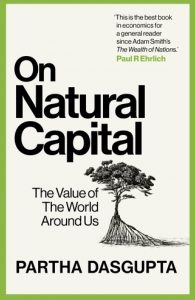I’ve just re-read Partha Dasgupta’s On Natural Capital, having seen a draft a while ago. It’s an important book. Its fundamental point is that the economy – like all human life – is not separate from nature but part of it. This has significant implications for economics, which has to date treated the environment as a separate domain. There is a huge amount of excellent work in environmental economics, of course, but the environment needs to be woven into the fabric of all of economics, and policy analysis.
The second key argument is that the resource envelope nature makes available to us is not growing exponentially. Partha sees this as imposing a strict limit on growth. He summarises this in an equation, the Impact Inequality; there is too much demand on nature if Ny/α > G – that is, if population times per capita income divided by a technology parameter α exceeds the capacity of the biosphere to renew itself. Much of the early part of the book demonstrates that, on the contrary, human economic activity has been depleting nature, particularly since around 1950.
Other people will see more hope than does Partha in the potential for technological innovations to alleviate resource constraints. My query concerns the definition of ‘y’, as a growing share of the value of GDP, the conventional measure, is accounted for by intangibles. So growth of course needs resources but perhaps less than one might think. In any case, the Impact Inequality is more important than the more famous r>g equation. And I’m completely on board with the idea that economic measurement and policy need to involve thinking like an asset manager about the whole range of resources needed in the economy (and life). I focused on this idea, which Partha helped pioneer, in my book The Measure of Progress.
In addition to wealth measurement and the portfolio approach, On Natural Capital goes on to discuss the role of social infuences and behavioural policies in bringing about change, and also the incentive mechanism of payments for ecosystem services.
It’s a terrific book, and aimed at the general reader as well as the economics and policy professions. The Impact Inequality is the only equation and the book is non-technical. It draws from Partha’s Biodiversity Review for the Treasury, which has all the technical material. There is also a wonderful New York Times video by Alexander Skarsgard about Partha and his work. After reading On Natural Capital, one can only weep at the way the salience of humans’ depletion of nature – and so also of our future economy – has declined in the public mind in recent months. I hope lots of people read the book.

